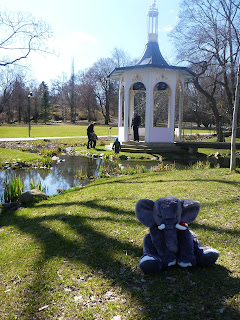Both fifth grade classes at Folkungaskolan had 100% native
Swedes. While Folkungaskolan has many students of differing nationalities, the
fifth grade had an unusual lack of diversity. In my first week with these
students, I observed an air of superiority in their interactions with students
in the school from other countries. The classroom teacher expressed concern that
if left unaddressed, these intolerant attitudes could escalate into racist
tendencies. I decided these students could benefit from a lesson about
stereotypes. It was clear these students meant no harm; they simply didn’t
understand how hurtful racial stereotypes can be. To raise awareness I designed
a lesson to guide them toward considering stereotypes from multiple
perspectives.
I began the lesson by explaining the term "stereotype" and giving a few examples (the French are all snooty, the Swiss are all beautiful, etc.) Then I asked the students to break into groups of 4 and discuss stereotypes they believe or have heard about Americans and stereotypes they think Americans believe about Swedes. After a few minutes we returned to the whole group setting. The students raised their hands to share and I wrote a list on the board. For Americans it was very predictable:
- Fat (most of the answers had to do with Americans being fat)
- Lazy/selfish
- Happy
- Rich
Next we made a list for Swedes. The things the kids said they thought Americans said about Swedes included: "the best,"thin, and blonde hair and blue eyes. After they shared these answers I pulled out a paper and pointed to it. "Are you ready to hear what Americans actually think about Swedes?" I had compose this list by asking several Americans (both children and adults) what stereotypes they've heard or believe about Swedes. A few students looked a little nervous but they were all excited to hear the list.
I wrote each one on the board and explained:
The best Arrogant: It's interesting that you said "the best" because in America, many people believe Swedes are arrogant and superior. Arrogant is when people think too highly of themsleves. They think of you the way you've said you think of the French.Thin Giant: I'm sorry. No one I asked said they think Swedes are thin. Many Americans think Swedes are giants. They think you start at 6 ft tall and that you are big from all the potatoes and meatballs.- Blonde hair and blue eyes: You were right about this one.
- Stoic: Many people think Swedes walk around like robots, they don't get very happy or very sad
- Ditzy: Not just in America, several countries think Swedes are very ditzy and stupid.
- Swedish Chef: I
know many of you all know this one. Many Americans think Swedes talk like the
Swedish chef.
(I played a
youtube clip of the Swedish chef for the children who had not ever heard him.
They were very amused That Americans think they sound that way).
I circled the list of Swedish stereotypes: arrogant, giant, blonde hair and blue eyes, stoic, ditzy, Swedish Chef.
"Do you think these words describe you, your family, and your friends?"
The answer was a resounding "No."
"Why do you think people in several different countries all say this about you if it isn't true?" Answers varied but all centered around one answer which hit the nail on the head, "I think that If they don't know us very well they may meet one Swede who seems this way and then say it about all of us. I also think people say these things because in TV shows, this is how they make Swedes look."
"How do these words make you
feel?"
"Right now, funny. I think it is funny to hear these, they make me laugh. But if someone said it about me for real I would be sad and mad too."
"Do you think it is fair that their are many people out there who before even meeting you would decide not to be your friend because of these stereotypes?"
"No that isn't fair at all. Not all Swedes are this way. I dont want people to think I am this way."
"Raise your hand if I am the first American you have ever met." All but three students raised their hands. I circled the list of American stereotypes: Fat, lazy/selfish, happy, rich.
"Let's go through this one at a time, and please be very honest. You aren't going to hurt my feelings. I'll start from the bottom: Am I rich?"
"Well you are a teacher and they don't make a lot of money, you said you share one house with four roommates, so no. I guess you aren't rich."
"Ok what about happy?"
"Yes, you seem to be a happy person. You smile a lot and are very friendly."
"Well thank you. How about lazy? Am I lazy? Am I selfish?"
"No!! You teach many classes for us and you come to our choir class during your breaks to hear us sing! You always put us first. You even came to our talent show and many of our parents didn't show up!"
"Yes I care about you very very much and I will always work hard for you. So I'm not lazy and not selfish. Now I saved this one for last because I think many of you talked about this: All Americans are fat. So me then? I must be very very fat, yes?"
"Nej Nika! No! You are not fat. But that is because you are special. aren't all the other Americans fat?"
"Well let's find out. Raise your hand if you met Max at the talent show. Max is American, so he is also very fat, right?"
"No! Max is thin too!"
"Ok you have seen pictures of my roommates and of my family. All of them are American. Are they fat?"
"Not at all! they look normal. They look like Swedes!"
"Exactly. It is true that many Americans suffer from obesity, but this is a problem many countries have, even Sweden. But does that mean everybody is obese? Your class room has many students who like Justin Bieber, but it wouldn't be true if I said every student here likes Justin Beiber. Every country has fat people and thin people. So why do you think everyone says Americans are so fat?"
"For the same reasons Americans think we are all blonde. The tv characters! They make Americans seem fat and lazy so people believe it."
"When I told you Americans say Swedes are blonde, arrogant, stoic, ditzy people who sound like the Swedish chef. How did that sound to you?"
"It sounds silly. Its silly to even think that every swedish person is exactly the same way. I can't believe Americans said that and didn't know how wrong it is."
"How do you think it would sound to Max, or another American if I read them your American stereotypes?"
"I think Max would think our list is just as silly and wrong as we think the other list is."
"Now you all have been very very mature about all of this. I knew I could do this lesson with you and you wouldn't take it personally or get your feelings hurt because you know I don't believe any of those stereotypes, so this is a safe place to discuss it. Many of you have even made jokes about it. But can you think of any reasons why saying a stereotype about someone you know might not be a good idea?"
"When we say it here in class we are talking about it and we know you don't mean it. But if I heard someone else say a stereotype for me in school or with friends, it would hurt my feelings. It's a bad idea to say because people could get hurt feelings."
"I think you are absolutely right. Can anyone else tell us why it's a bad idea to believe stereotypes?"
"Even if you know a lot of people who are a way, some people might not be. I know a lot of snooty French people, but my best friend is French and she isn't snooty. If I thought all French people were snooty I never would invite her to play and then I wouldn't have my best friend."
"That's an excellent point! If we believed stereotypes, just think of all the wonderful people we never would've met. Everyone on earth is their own person with their own choices. It's very important to give everyone a chance and not judge them just because they are not from Sweden. If I thought all Swedes were Arrogant I might not have come to Sweden, and then I would've missed out on all of you!"
At the end of class one of the students who I thought about when I planned this lesson, raised her hand. "Nika, I don't have a question but I wanted to say on your first day here I saw you with Bjorn and my friend said you were the American teacher who would join our class. When they told me I said 'No, you are confused, she cant be the American. Our American teacher will be fat and much louder.' But now I think that if you had seen me and thought 'That can't be my student, my student will be ditzy and never smile.' It would make me feel sad. I'm very sorry I thought things before meeting you. I could've missed out on the beautiful person you are. I am very happy you are here and if I hear any Swedes stereotype other people I will give them a great big talk because my favorite person in the world is an American!"
I think this discussion was very enlightening for everyone. They found the Swedish stereotypes to be very funny and ridiculous, which helped them to realize how ridiculous all stereotypes are. The last student's comments really meant so much to me. America is so far away and many of these kids hear things in the media and assume it is true. But this really proved just how open they are to reconsidering their point of views.




























